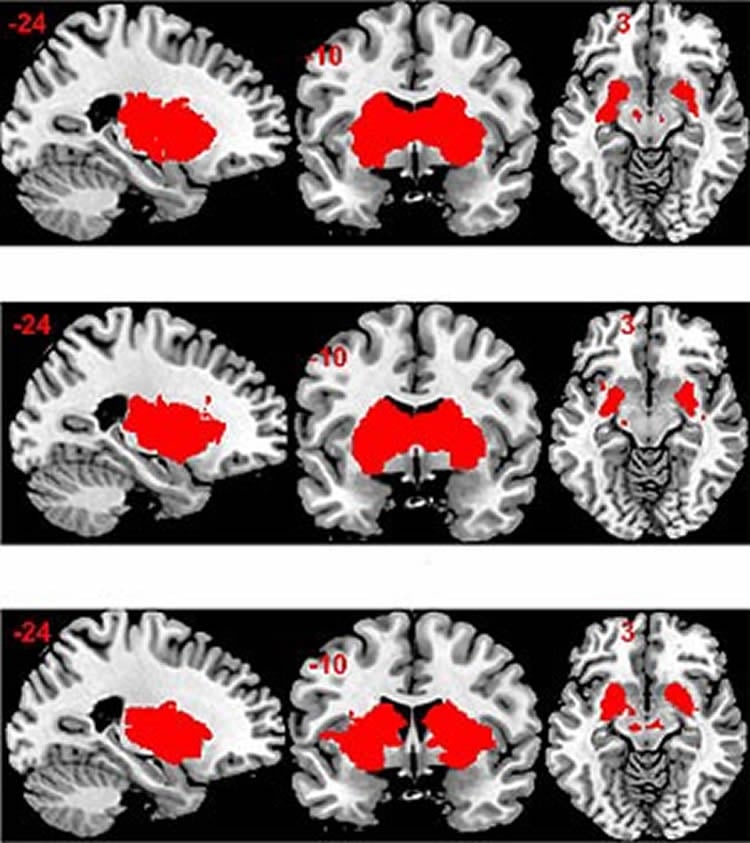Fructose not only results in a lower level of satiety, it also stimulates the reward system in the brain to a lesser degree than glucose. This may cause excessive consumption accompanied by effects that are a risk to health, report researchers from the University of Basel in a study published in the scientific journal PLOS ONE. Various diseases have been attributed to industrial fructose in sugary drinks and ready meals.
Fruit sugar, or fructose, is a carbohydrate that occurs naturally in fruits and vegetables and is generally harmless in this form. Despite their similar structures, fructose and glucose – that is, pure grape sugar – affect the body very differently: an intake of glucose causes a sharp increase in blood insulin within minutes, whereas fructose stimulates insulin secretion to a limited degree only.
Teams of researchers led by Professor Christoph Beglinger from the University Hospital and Professor Stefan Borgwardt from the Psychiatric University Clinics (UPK Basel) have now taken a more in-depth look at how these two types of sugar affect interactions between the gastrointestinal tract and the brain. Their work was funded by the Swiss National Science Foundation. In their study, the researchers used combined pharmacological and imaging methods such as functional magnetic resonance imaging (MRI).

Brain activity examined
In the placebo-controlled, double-blind study, twelve healthy young men were given either fructose, glucose or a placebo by way of a feeding tube. Blood samples were then taken from the subjects to measure satiety hormones. The subjects were also asked about how satiated they felt, and their brain activity was monitored by MRI while at rest.
The findings of the pilot study were as follows. Unlike glucose, fructose is less effective at creating feelings of satiety and stimulating the reward system in the brain. An analysis of the MRIs in fact showed that the two types of sugar differed greatly in terms of network activation within the hippocampus and amygdala areas of the limbic system, i.e. the regions of the brain that regulate emotions and impulses. Furthermore, in contrast to glucose (which stimulated a strong signal) the levels of satiety hormones in the blood barely or only minimally increased following fructose consumption. The subjective feeling of satiety also tended to be less affected by the consumption of fructose.
The problem of fructose
“The study may provide the first key findings about the lack of satiety and rewarding effects triggered by fructose,” state lead authors Dr Bettina Wölnerhanssen and Dr Anne Christin Meyer-Gerspach. The role of the differing insulin levels and other effects will have to be demonstrated in further studies with more test subjects. Research is increasingly finding indications that isolated, industrially manufactured fructose – which is increasingly used in sugary drinks, sweets and ready meals – is problematic for the human body. It is suspected that fructose promotes the development of various disorders such as obesity, diabetes, fatty liver disease and gout.
Funding: The research was primarily funded by the Wellcome Trust with additional support from the Medical Research Council and the NIHR Cambridge Biomedical Research Centre.
Source: University of Basel
Image Credit: Image credited to University of Basel, Department of Biomedicine
Original Research: Full open access research for “Dissociable Behavioral, Physiological and Neural Effects of Acute Glucose and Fructose Ingestion: A Pilot Study” by Bettina Karin Wölnerhanssen, Anne Christin Meyer-Gerspach, André Schmidt, Nina Zimak, Ralph Peterli, Christoph Beglinger, and Stefan Borgwardt in PLOS ONE. Published online June 24 2015 doi:10.1371/journal.pone.0130280
Abstract
Dissociable Behavioral, Physiological and Neural Effects of Acute Glucose and Fructose Ingestion: A Pilot Study
Previous research has revealed that glucose and fructose ingestion differentially modulate release of satiation hormones. Recent studies have begun to elucidate brain-gut interactions with neuroimaging approaches such as magnetic resonance imaging (MRI), but the neural mechanism underlying different behavioral and physiological effects of glucose and fructose are unclear. In this paper, we have used resting state functional MRI to explore whether acute glucose and fructose ingestion also induced dissociable effects in the neural system. Using a cross-over, double-blind, placebo-controlled design, we compared resting state functional connectivity (rsFC) strengths within the basal ganglia/limbic network in 12 healthy lean males. Each subject was administered fructose, glucose and placebo on three separate occasions. Subsequent correlation analysis was used to examine relations between rsFC findings and plasma concentrations of satiation hormones and subjective feelings of appetite. Glucose ingestion induced significantly greater elevations in plasma glucose, insulin, GLP-1 and GIP, while feelings of fullness increased and prospective food consumption decreased relative to fructose. Furthermore, glucose increased rsFC of the left caudatus and putamen, precuneus and lingual gyrus more than fructose, whereas within the basal ganglia/limbic network, fructose increased rsFC of the left amygdala, left hippocampus, right parahippocampus, orbitofrontal cortex and precentral gyrus more than glucose. Moreover, compared to fructose, the increased rsFC after glucose positively correlated with the glucose-induced increase in insulin. Our findings suggest that glucose and fructose induce dissociable effects on rsFC within the basal ganglia/limbic network, which are probably mediated by different insulin levels. A larger study would be recommended in order to confirm these findings.
“Dissociable Behavioral, Physiological and Neural Effects of Acute Glucose and Fructose Ingestion: A Pilot Study” by Bettina Karin Wölnerhanssen, Anne Christin Meyer-Gerspach, André Schmidt, Nina Zimak, Ralph Peterli, Christoph Beglinger, and Stefan Borgwardt in PLOS ONE. Published online June 24 2015 doi:10.1371/journal.pone.0130280






